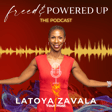Roots of Scarcity and Competition
00:00:01
Speaker
So as long as I'm rooted in scarcity and separation and superiority, we just proliferate more of it. So now we have a bunch of charities that are handing out little handouts here and there. And now we have different orphanages competing for the handouts. They're not enough for all of us because we created a new system of competition because the separation is the root.
00:00:26
Speaker
because separation is the root. Ooh, that hit me so deeply because that is exactly what is happening.
Introduction to 'Freed and Powered Up'
00:00:46
Speaker
Welcome to Freed and Powered Up. Here is where conscious female leaders can really start to break free from the self-sabotage, the fears, the triggers, and limiting behaviors and beliefs that keep us from being our highest and best selves. Every episode, I'm going to reconnect you to your inner power. I'm your host and your sister, Latoya Zavala. Let's go.
Special Episode and Shared Experiences
00:01:17
Speaker
Hello, hello and welcome listeners, welcome Phoenix's, welcome all you listeners to Freed and Powered Up. I cannot tell you how excited I am about this podcast. It's different from the other episodes. You all know my scheme, you know what my message is, you know what the core of my work is.
00:01:41
Speaker
And yet this episode is very connected and still different in the same way. And I am super excited to bring this to you. I'm excited about my new friend because we have so much in common. We both sold all of our possessions and moved to Europe for different reasons. But we did this thing. We're living in our purpose and really truly
00:02:08
Speaker
desiring and committed and convicted in making a difference. And what she's doing is really just nothing short of amazing, and what I would consider extremely important. And something that I've not delved into from her perspective, I have not really
00:02:33
Speaker
connected in a deeper way. And so I think it's important for us to have this conversation. Therefore, this is why she's here.
Introducing Dr. Rita Fierro
00:02:42
Speaker
And today we're talking to Dr. Rita Fierro. And she is a social justice consultant and coach who equips leaders to lead successful social justice initiatives, even when they face pushback.
00:03:00
Speaker
And I'm saying that because that's what was written, but I know for sure that if you're out there trying to make a difference, you are facing pushback. And so in the face of pushback, her role, her work is to help you be successful. And so without further ado, I'm going to bring on my friend, Dr. Rita.
00:03:26
Speaker
Hi, Ria. Hi, I am so pleased to be here. Thank you. I feel so honored in your introduction. It was just really warm hearted and beautiful. Thank you. You're so very welcome. And I just thank you for the work that you're doing. Thank you for the work that you're doing. And speaking of the work that you're doing, I've said a lot of words. And the line of who you are,
00:03:55
Speaker
speaks volumes, but I would love for you to just tell the listeners and tell the people in the most simplest terms, what is it that you do?
Challenges in Social Justice Leadership
00:04:10
Speaker
So I equip leaders to make the difference they wanna make in the world by being an advisor, a coach, and a strategist. And so basically what that means is that I've seen so many leaders, yes, I've seen many, many white women sabotage the work that we say we want to do.
00:04:35
Speaker
like many in particular women in, predominantly women, but many people in the social justice space end up sabotaging the very work that they believe is their legacy work. And so part of what a coach and a divisor does is help people, like it's kind of a reality check.
00:04:54
Speaker
in the moments where fear kicks in and we start facing pushback and we want to make the decisions that's business as usual, when actually it's the time to step into a bigger courage.
00:05:09
Speaker
I'm kind of like the voice in the corner and the voice of conscience in those moments, but I'm also a person who has studied systemic racism for the past 30 years and can help equip leaders to see, okay, you're facing pushback in this way, let's strategize, let's study the pushback and let's strategize to find a way through.
00:05:35
Speaker
Because the system's designed to have us take it personally and go into a place of shame and self-defeat. And so what happens is that most of us, when we receive pushback, as I did at some point in my journey, we just go into this, I'm not good enough and the world sucks and I give up.
00:05:56
Speaker
And the system is designed to do that. Like that's how the system stays what it is, is because it's designed to burn out and be down people who envision something different. And so I'm the person, for 25 years I was the person who got hired to assess and calculate and measure to what extent were programs making the difference they intended to make.
00:06:25
Speaker
And after 25 years of that, and just constantly looking, okay, what's the source of that? Okay, you're not making the difference. What's the source of that? Oh, the organizational culture plays a big role. It's not just what activities are you doing? Okay, what's the source of that? I started seeing that if leaders aren't in a place of bold and courage and healing of our own moons, we can't master the courage that it takes
00:06:56
Speaker
to make real change? Yeah, it's so deep because no matter how you put it, it takes courage to make real change. Like, that's like a nucleus, right? It takes courage. And the reason why it takes courage is because, like you said, of all the pushback, because the system is designed for you not to succeed.
00:07:21
Speaker
Yes. Right. For you not to succeed.
Resistance to Change and Maintaining Power
00:07:24
Speaker
You know, it's interesting you said that because I was just, you know, the last couple of videos that I made, it was talking about, I don't know why, but I just kept hearing this word downloaded, the homeostasis, right? Like everybody's comfortable. Not everybody, but those that are in power are comfortable with the way that the system is. They're comfortable with the way things are, right? And those who come to shake up the apple cart, those who come to disrupt, you know, the comfort,
00:07:51
Speaker
It's like we've got to stop them. We've got to push back. We've got to suppress and we've got to do it in a subtle way where they don't even realize that this is what's happening. I'd love for you to talk a little bit then about what you said in the very beginning about women who are truly wanting to affect change that they began to sabotage themselves.
00:08:19
Speaker
And I'd like to go back to that because I really honestly think the two are intertwined, right? The system is set up so that we fail and therefore we begin to sabotage ourselves.
00:08:37
Speaker
And kind of looking at it in that space, at the end of the day, it really isn't that we're sabotaging ourselves, it's that the system is sabotaging us, and we've taken on those beliefs, and we've taken on those projections, we've taken on their truths, and then we continue the sabotage cycle. How do you feel about that? What are your thoughts about that?
00:09:00
Speaker
Yeah, I think what you're saying is absolutely true. I want to say in my words, something you said before and then come back to this if you don't mind. First of all, can I say curse words or not on air? Bring it. Absolutely. The asshole on the job is purposefully placed. Ooh.
00:09:26
Speaker
That's good. That's where we don't see the system, is we think it's just the asshole on the job. It's just that asshole bureaucrat that is busting my chops about this thing I'm trying to get. No, no, no, no. The asshole on the job is the system. The system consistently hires the bureaucrats and the assholes on the jobs to get in the way of the innovators, the trailblazers, the justice seekers, the warriors.
00:09:53
Speaker
It's designed to do that. So every office, every nonprofit, every business, like the assholes on the job are there to keep the status quo. Wow. And consistently and purposefully hired. Wow. Wow. So to your piece around the relationship between fail and sabotage, I would also say that the system also tends to hire
00:10:30
Speaker
Whoo! Okay, so we're just going to dive in quickly. Okay, go ahead. I've been in both of them, right? I've been in both of them. I've been burnt as the savior and I've been burnt as the martyrs, which is why I see this. You know, I often tell my coachees, I'm not telling you from the height of my experience, I'm telling you from the depth of my experience, because I've been already feeling on this, right? Like, I've had to see this in myself, and that's why I see it in you. So,
00:10:47
Speaker
the Saviors and the Martyrs.
00:10:56
Speaker
Uh, let me see. I have to, I had, there are some pieces that are confidential. So I've watched, um, I watched the foundation that, um, was out to do tremendous systemic change work. Right. Like decline, um, me and a group of people impacted by the system, like several years in a row, we were declined for funding. Then, uh, like,
00:11:26
Speaker
I turn around and who got the funding? A lawyer to create a new legal program that's supposed to teach lawyers how to support activists. And I'm like, wait, you didn't fund the activists? You funded the lawyers to teach the lawyers to not sabotage
00:11:48
Speaker
And so what the system does, and I know the people that were hired are fabulous badasses. I'm not talking about not change makers. They're still phenomenal change makers. But if your intent to systems change, you're actually hiring the least
00:12:15
Speaker
Trailblazing, the least innovative profession is that of being a lawyer. Like the lawyer is trained to follow the law. Lawyers are not trained to break the mold. Sometimes to make new laws, great. But what about all the practices that systemic racism, anyway, I will get off my side.
00:12:34
Speaker
There's so much. So what the system tends to do is to hire those of us who feel good about ourselves when we save others or those of us who believe in self-sacrifice because we're the easiest to burn. So can you tell us when you say burn, what's your definition of that? What does that mean?
00:13:02
Speaker
So I'm white, so I'm going to stick to white folk. I'm just going to stick to white folks. So white saviors.
00:13:15
Speaker
will get most easily confronted by folks of color, especially in the environment we're in right now, right? Like folks of color, some type of saviors that, there are folks of color coming out of the woodwork everywhere going like, screw you and your saviorism, right? So an institution that wants to show it's changing without really changing can hire a white savior.
00:13:40
Speaker
and the whites say people get pushed back by black folk or folks of color right and then they get to say well we hired someone but it didn't really work right and then they get to place blame oh it's because the black people they don't want help but they don't want change or they don't want oh this is so those games happen frequently right it's all sort of a game of like
00:14:04
Speaker
We had a position, but no Black people applied. We created a workshop, but no Black people came. And it's all that game, right? It's that same game. At the same time, and the martyrs was similar.
00:14:21
Speaker
So if you choose a person who has an approach towards self-sacrifice and has any color, who burns you looks different depending on the color of your skin.
00:14:35
Speaker
Yeah. If you are a person of color who just got hired in a DEI position just to talk about something that's fashionable since now we're compromising DEI initiatives. I've seen so many people of color who were hired in DEI positions put in the position where they couldn't actually do their work.
00:14:58
Speaker
Okay, let me just, I gotta say something right there. So first of all, can you just say what DEI is? Because I remember seeing that on Facebook so long and then I was like, what was DEI? Diversity, equity and inclusion. Some people add a B for belonging. People who do more, the relationship building add belonging. People who have more of a framework towards policy and change making add justice. So often it's EIJ or DIB. Okay, so I need to say this because
00:15:28
Speaker
Okay. There's so much going on in my head right now, but there's actually a podcast
Systemic Sabotage in DEI Roles
00:15:35
Speaker
episode here on Freedom Powered Up where I recorded exactly what you said. She shared her experience. She is a PhD. She's African descent.
00:15:48
Speaker
and culture, and she is phenomenal expert at what she does. And she explained exactly what you said, that they hired her in this DEI position and then sabotaged her the whole way, was not able, in fact, to do what they said they hired her to do. Right. So if I don't know this person, right, so I'm talking
00:16:12
Speaker
about in general, not specifically this person. But when a leader of color is in that position or, and I would add in some ways also when a white person is in that position choosing allyship, either we have communities of support and healing around us that allow us to go and heal. And we learn and have the courage to walk away from the position. Because if I have a heart for social justice and I can't make change in a place, at some point I have to choose to walk away.
00:16:42
Speaker
Right, right. But if I have a tendency towards being a martyr, that I'm going to keep on going at that wall. Right. And because there is a culture now that makes us believe that self harm is activism. Yes.
00:16:58
Speaker
Yes, somebody has to be the sacrificial lamb. Right. Not only will I walk away from that job, I will walk away from the work altogether. And then the system wins. And because you walked away from the work, you walked away, you burn, you put yourself through so much harm and so much pushback without the adequate support and community.
00:17:22
Speaker
that there's nothing left for you to go, I mean, my joke is eat chocolate cake, but like go become a farmer, go become a farmer, like go do something that nurtures your soul that has nothing to do with social justice. And then the system through that tendency towards being a martyr, the system has now won because you have now worked 20 less years than you could have at making a difference. Right, right.
00:17:53
Speaker
So sometimes the communities of support are about teaching us to walk away. It's not always about teaching us to push through because we have to push through where it works and when it works and when it works and when it's appropriate. And so to your point about the cycle between failure
00:18:16
Speaker
You said sabotage, right? The system wants us to fail and then when we sabotage and strengthen the field system, it's because the system is us. Like we don't want to face that the reason why we elected a narcissist as president is because narcissism is normalized in our culture. Like that would not stand if we weren't, if it weren't reflected in our everyday life.
00:18:45
Speaker
Yeah. And not only normalized, but exalted. I would say celebrated. Celebrated. Rita, I am having like so many ahas go off in my head. This is the way in not only social justice as it pertains to racism, but this is the way in social justice as it pertains to like making headway in
00:19:15
Speaker
Help helping people victims of domestic violence and you know sexual assaults and and and and and and I myself was a part of it. In the Navy and in fact and in fact. I would I would venture to say that it is a it is a small part of why I left.
00:19:40
Speaker
feeling the cynicism, feeling the sabotage of the system and deciding that I could not be a part of this sabotaging cycle again and again. And I'm not talking about defense of the country and defense of the nation. I'm not talking about that. I'm talking about the inner wars, right? Of trying to prevent and stamp out and really help people who are maneuvering these waters of domestic violence.
00:20:10
Speaker
I wanted to share something super, just an example real quick. I was asked if, I was asked if, not if, I was sent on a deployment. There were two places, I'm not gonna give specifics. There were two
Misallocation of Expertise in Cultural Issues
00:20:28
Speaker
places. One place had an issue with shelters of women who have coming through domestic violence and the other place had an issue with schools.
00:20:41
Speaker
And they had a choice of who to send where. And they sent me to the place with schools and they sent a white male to the place where there were women of color moving through domestic violence and the shelter. And I thought, isn't this something?
00:21:08
Speaker
And I was, I was upset read I was incensed because it doesn't make sense if you were really trying to send someone to really get in with the culture and really, you know, connect with and it didn't make sense to me. And I'm not saying that they're a white male couldn't help or couldn't do anything. But in this very sensitive place and culture, it was the wrong move. If
00:21:38
Speaker
you really wanted to make change. And that is the rub, isn't it? If you really wanted to disrupt. Yep. And it could be
00:21:52
Speaker
are you up for me playing devil's advocate, not to go against you actually, but just the complexity of it, right? And this is why I say that the role of leaders is so important. It could be as easy, right? As the person who made that call the day before,
00:22:12
Speaker
having a fight, being a white woman, I'm just gonna make it up. Let's say it was a white woman who made that call, right? And the day before, a black woman of the group of domestic violence survivors confronted her and said to her, you haven't checked your racism, right?
00:22:33
Speaker
And that person maybe was still processing and didn't have a community where she could go back to and say, yo, I am really challenged by this. I was called racist. This has been my work my whole life. I can't freaking believe it, right? And I can't believe that this woman, and maybe I mentored her for 10 years. Like I can't believe this woman who I've been there for 10 years suddenly turns around and calls me racist. Like it's just like, right? And in that moment,
00:23:02
Speaker
Her choice is, well, if I send a black woman over there, the black women are going to gang up against. And they're already getting up against. So I'm going to send a white man over there to break it up. Now, the thing about that, and as a black person, you know this, most black folk know this. But the work that I do when I'm working with white folk is, that can be a second.
00:23:31
Speaker
Like I'm talking to you about it because I see that in me and I do work daily to like work on it and unwork it, right? Like my book is called Digging Up the Seeds of White Supremacy. Like I work daily on myself on digging up those seeds and seeing it and confronting it. But for people who aren't aware of it, it could be a split second decision. It could be like, I don't feel that good about having all black women over there. Let's create some diversity.
00:24:01
Speaker
Right, right. And really, what's underneath it, I'm afraid is they're going to gang up on me. Right, right. And it could be like a plethora of different scenarios similar to that in any way, shape or form. And I love that you're coming at it from a perspective of how do we get underneath it? How do we get underneath our ship? Yes. So that we
00:24:30
Speaker
are not hiding under the mask of helping. I love exactly how you put it. How did you put it? From inner to outer, right? What is it that you said? Inside out. Inside out, absolutely. Inside out. There's so much. I'm looking at, I think this is a perfect segue into this conversation that I desperately want to have, but I'm looking at the photo
00:25:01
Speaker
that you said is directly tied to the work of the book, which I'd love for you to talk about, digging up the seeds. And first of all, the image is incredible. I hope to somehow link it to the podcast episode and show it somehow in the video, however you're accessing this, Phoenix's. But there's a swirl in the center of this tree image.
00:25:28
Speaker
And I'd like to go into the yellow swirl, right? So the yellow swirl comes underneath the word fear, and it has a root word savior. And then it branches off into a juvenile justice, mental health, welfare, child welfare. And I would love for you if you could, because how you just explained it to me, I promise you is mind blowing.
00:25:57
Speaker
for me and your work, this work, just this branch alone, I really believe will set a lot of people free. So the book was about me going 500 years back in history and finding the seed of the first law in each of our institutions and systems. And I did that across 10 systems.
00:26:28
Speaker
And what I found was, and the premises was, let's think of it like a tree.
Historical Roots of Systemic Racism
00:26:37
Speaker
Now, I know I've been mentored by many Black scholars. And so I know that Black folk, if you ask a Black person, you say the system is unequal and discriminatory. Black folks will say, uh-huh, right? Most Black folks will say, uh-huh. If you ask a White person, their response will be, what system? No, you can leave the description. I'm good with that.
00:27:05
Speaker
If you ask a white person, a white person will say which system are you talking about, please define it. Because this is how we have been, we white folk have been trained to not see the whole, is by seeing it. And I assert after all my 30 years of studying
00:27:26
Speaker
systemic racism, that they're all branches of the same tree. Because the results are the same. Whatever branch you're falling on, right? We know that, anyway, I could run the data, but I want to answer your question. On each of these branches, there is plenty research to show that folks of color have worst results than white folk, right? Like on every branch, just education,
00:27:54
Speaker
And so something's going on that's in common. And what I wanted to find, I was like, okay, so let's assume it's all the branches of the same tree, then what is the seed? And what is the soil that we have been nurturing for 500 years that has the results of the seed, despite the fact that we keep trying to change it?
00:28:16
Speaker
Wow. Right? Because simply an apple tree will give up, like apple seeds give apples, orange seeds give oranges. You can staple oranges on an apple tree from morning till night. It's not going to make an orange tree. Right. So this is the premises of the book. I felt like I had to do that overview. So what I found with those 500 years of going back and looking at, okay, what's the intention? What's the seed?
00:28:42
Speaker
that gave birth to the laws, that gave birth to the institutions, that gave birth to what we know it's to be today. And bottom line, what came out was fear. In the variations of control, safety and saviorism. What I found was that the systems, the legal and the health system were born by a need for safety.
00:29:11
Speaker
And the immigration, education, economic and criminal justice system were based in a need for control. Of course, control in particular of white men over Native Americans in the face of genocide. That then was extended to African Americans, well,
00:29:30
Speaker
enslaved Africans when Africans arrived. Actually, some of them as enslaved Africans and some as indentured servants because slavery didn't start immediately. It wasn't the only solution. It took about 200 years for North America to decide that we were going to handle, well, we were going to interact, handle is awful, interact with people of African descent only as enslaved. That took some years to build.
00:30:01
Speaker
So back to your question around saviorism. So these six systems that I just talked about were born and embedded in enslavement. And so what we see today are still the ways in which enslavement and genocide are kind of baked into the bones of these institutions. The saviorism systems have a little bit of a different origin.
Impact of Scarcity Beliefs on Society
00:34:55
Speaker
Like, I actually need you to say that again. When we don't do our internal work, we think we're solving problems, but we're actually multiplying the problems.
00:35:08
Speaker
So when we don't do our internal work around believing in our inferiority, scarcity, in this case, it's scarcity. If I believe in scarcity, if I believe that there's not enough for everyone in the world, despite European Union throws away, I don't know how many tons of butter every year just to keep the price artificially high. But if I believe that there's not enough food for the people of the world,
00:35:37
Speaker
then I'm going to create charity programs for orphans where they get to eat decently once a day, which is kind of what the orphanages were doing back in the 1800s, right? Like I'm going to create something so the orphans can eat well once a day. Right. Instead of shift, because I don't believe in my own power,
00:36:00
Speaker
As a woman, as a human, I don't believe in the strength of institutions to protect my interests. I don't believe in my power to shift the institutions that are supposed to represent me. Then I'm not willing to go to the institution and say it's unacceptable that we have children in our society, in our city, in our town who can't eat. Let's create a way that there is enough for everyone to eat always. Right, right.
00:36:25
Speaker
So as long as I'm rooted in scarcity and separation and superiority, we just proliferate more of it. So now we have charities, they're handing out little handouts here and there. And now we have different orphanages competing for the handouts. Oh, not enough for all of us. Because we created a system of competition because the separation is the root.
00:36:50
Speaker
because separation is the root. Oh, that hit me so deeply because that is exactly what is happening and perpetuating the system. And therefore keeping those who want this balance right here, keeping them feeling comfortable,
00:37:21
Speaker
and safe and in control. And not only that, I would say, but hopeless.
00:37:33
Speaker
Hopeless because most change makers I've been finding this especially lately I've been interviewing on my podcast some elected officials and having more conversations lately and what I realized is People say to me over and over again. Oh, it's not that I don't think the system is unequal or discriminatory I just don't want to focus on the system because it leaves people no power And I'm like who the hell created this sucker
00:38:00
Speaker
Right. A bunch of white folk came together and decided, Henry, we're all getting sick. We should create a building where people can go when they get sick and we should bring some doctors in here. We made it up. We created institutions because we were trying to resolve issues. Right.
00:38:30
Speaker
Right. I mean, as awful as an institution as enslavement was, but it was created for purpose. A bunch of people came together. We're trying to solve the problem and said, hey, how can we solve this problem? Oh, let's do this. Right. And yet we could see from the graphic.
00:38:48
Speaker
Yeah, we can see from the graphic, though, that even though they were trying, they were trying to create the solution, they were creating the solution from this nucleus here of fear, and the branches of these illusions that were still working within them was feeding the fear and therefore, and therefore became a part of their creative solutions.
00:39:13
Speaker
Yes, and I'll add, because this is the I mean, there's a lot more in the book, of course, I want to preach too much. But there's one sign that was like, just brought me tremendous hope, is that each of these systems was born in a time of crisis. Because in times of crisis, there are new pathways that are created. And people tend to come together more.
00:39:43
Speaker
Um, and so the reason I say that's a note of hope, because I believe in our post COVID area, however, an arena era, I think we're in that period of crisis. Like, I think these systems are actively breaking down. None of them are meeting what we believe they were supposed to do to begin with.
00:40:03
Speaker
They're all in crisis one way or another, I think. Yeah, absolutely. Absolutely. So, the questions that we have around, you know, defunding police or undoing the family policing system is how a lot of activists are calling in the foster care and adoption space or
00:40:22
Speaker
the amount of people who are homeschooling their children. Like, that's fascinating to me. And I was, I used to be extremely critical of it until like I started seeing like, oh, that's, and what happens is how systems change is that the innovators start leaving and they start experimenting with new things. And then when the old system is in crisis enough that people want to jump ship,
00:40:45
Speaker
those pioneers and innovators have like created something. That's how Tesla was born, right? Like they've created something. It's like, oh, you scared enough about the end of oil? I got something for I have a prototype for you. And so this concept that I feel like it's really the core of my work that we don't want to look at the system as a whole because we get discouraged.
00:41:11
Speaker
We have to look at the system as a whole so that we can incubate other ways of being together that aren't based on superiority, scarcity, and separation. And of course, this is not a completely original thought. There are plenty of communities that are doing it. I think what I really aim to do with my work is to just kind of link it together. The communities that are trying to find new ways to organize together aren't just
00:41:37
Speaker
No, they're experimenting with a new way of being together socially because we're screwing each other with the system. It actually doesn't, it was designed to serve white men, but I would argue it doesn't actually serve anyone anymore. And I would agree with you. And I would agree with you. I
00:41:57
Speaker
literally could have like two more hours of this conversation, which Phoenix's listeners stay tuned because there's so much more that really needs to be said. However, comma, I'm going to say right now, go and get the book. Go and get the book because as you can see from this conversation,
00:42:23
Speaker
There's no way that you can unsee once you see and it is life changing. Seeing this is life changing. Dr. Rita, where can they get the book?
00:42:35
Speaker
anywhere books are sold. It's on Amazon. There's an Audible version that I have done an audiobook of. I ask you to please not do it on Spotify because it's kind of ridiculous. Like Spotify is just screwing us all out of our intellectual property. That's all I'm going to say. And so I just ask that you please don't get it on Spotify.
00:43:01
Speaker
I'd say the name of the book. Say the name of the book again. Digging up the seeds of white supremacy. It's on Amazon, Bards and Nobles. You can ask your library to order it. You can always kind of reach out to your library and say, if they don't have it, hey, I'd like this book, can you please order it? And then other people can also read it.
00:43:22
Speaker
You can do the same for a local bookstore. So it's literally distributed in a way that it may take a little bit of time for you to get it sometimes but you can you can get it wherever books are sold. There's also for the printed copy is color.
00:43:40
Speaker
Okay, I made a choice that since the topic was depressing, the images didn't have to be depressing. So there's there's like a gorgeous woman from Trinidad who did this gorgeous colorful layout. So if for people who want to spend a little bit less money, there's a there's a Kindle version. Okay, beautiful price points and availability.
00:44:05
Speaker
And now for the people who are like, who is this woman and I really need to get in touch with her and I, maybe I am in social justice or maybe I want to get back into it and this is just the, this is just the kind of energy that I need. Where can they get in touch with you?
00:44:24
Speaker
Yeah, I mean, I, I spent a decent amount of time on LinkedIn, Rita S. Fierro. My last name is F-I-E-R-R-O. I have a website called, I have a few websites, but the one that I use most frequently is, or easier to say in this context, is a DrRitaRights.com. That's D-R-R-I-T-A, rights as in writing, W-R-I-T-E-S.com.
00:44:54
Speaker
And pretty much from there, you can you can find everything else. I have a Facebook page and on Instagram. I'm also handle Dr. Rita rights. And I'm not that hard to find. Just try to Google Rita Fierro. You know, you'll figure out some way to get in touch with me. I'm pretty, pretty accessible.
00:45:15
Speaker
Beautiful. And I definitely will have the links in where you have found this podcast. The links will be there in the in the show notes. Rita, I love you. Oh, I love you. My Southern Italian flair. I love that. And I absolutely love what you're doing. And I'm so glad for your light in the world. I'm so glad.
00:45:45
Speaker
Thank you so much. Thank you so much. Those of you who are listening, thank you for staying tuned. Thank you. Reach out to Rita. If you have questions, if you were, you know, touched in a certain way, you know, up or down, positive or negative, however you feel, and you just, you know,
00:46:08
Speaker
you need to continue the conversation. Please reach out to her or even reach out to myself. Drop your notes in the comments wherever you're accessing this, because this definitely needs to be a conversation that is continued so that we as a species can do what it is that we're on this earth to do, which is to elevate our consciousness and become other than what we are. And so again, listeners, you know,
00:46:37
Speaker
I am sending you so much love and power always and I will see you in the next episode. Bye everybody for now.
00:46:45
Speaker
Hey, infinitely expanding soul. How could I let you leave this podcast episode without knowing about an amazing opportunity to know yourself deeper and fall so madly in love with yourself that you ooze it out in everything that you do. To know your life path for certain and erase the doubt. To know your soul's purpose and what it came here to work out and the cycle it came to complete.
00:47:09
Speaker
to know where your major energies are aligning in your talents and your gifts, and where your major energies are aligning with your wealth consciousness. Yes, more money. And maybe most importantly, how to integrate it all into your life so that we stop spinning in circles trying to figure all this shit out in a world that hopes that we don't.
00:47:29
Speaker
in a super tight container with some energy clearing, laser coaching, and a vortex of women who are about not only their transformation, but they're about yours too, so that there's no room for leaving this space without getting what you came for.
00:47:45
Speaker
Welcome to Goddess Unlocked, a three-day live virtual journey into yourself and your infinite potential, your purpose, prosperity and power. This is all going down May 17th through the 19th. Click the link in the show notes to reserve your seat. Seats are limited and they're already filling up, so do not delay. See you back inside.
00:48:13
Speaker
The saviorism systems have a little bit of a different origin. So what we said beforehand, and I'm repeating now, I said with you privately and we're sharing now, is that I believe that when I look at the origin of these four systems that are based in saviorism, which are juvenile justice, mental health, welfare, and child welfare,
00:48:37
Speaker
I think the root is saviorism because the people who were giving birth to those institutions were actually white women. And I argue that because as humans getting dignity is a big part of who we are, in the face of white women being oppressed by white men, we were trying to get dignity by taking care of others. And in particular, trying to take care of children
00:49:06
Speaker
racism wasn't questioned. And so we were taking care of children, but we were still teasing out black children. And so each of these branches is bifurcated, has two other branches of its own because we consistently created different institutions for the rich and for the poor. And then black folks are always trapped into the ones, or most often trapped into the institutions for the poor, whether they're poor or not.
00:49:35
Speaker
Right. So I just want to mention some just for those who are listening audio and may not see the graphic, right. So under child welfare, for example, the branch for the poor will be foster care, and then the branch for the rich will be adoption. And like, wow, as I'm looking at that, and I'm seeing it, and I'm saying it, I just have flashes of all these children and all these agencies and all these, you know, news reportings and
00:50:07
Speaker
It's like my heart chakra is just like, failing, failing, like vibrating, you know, I'll say another one, the mental health branch. For the poor, you have free clinics and then for the rich, you have insurance. Yeah, I'm just okay with the pause because to actually see it graphically,
00:50:35
Speaker
is amazing. I don't I don't have another word. I don't have another word. It's it's mind opening. Yeah. I'd like for us maybe to just go into just a little bit if you're okay in our last few minutes to
00:51:04
Speaker
Talk about the roots because the roots, most of them start with the word of illusion. And I'll just read them, illusion of superiority, illusion of scarcity, illusion of separation. So I'd love for you to, if you're willing, talk a little bit about that, the roots being this illusion.
00:51:31
Speaker
Yeah, and so this is mainly why I talk about inside out being so important and why the methodology that I use in my work, I call it liberation inside out.
00:51:44
Speaker
is because if the inside is separation, superiority and scarcity, the outside shows. So to continue the conversation we were saying before, in the face of white women who were creating new systems of care for children, but who believed in the separation of humans and in their own inferiority, inferiority towards men and superiority towards black folk,
00:52:12
Speaker
And scarcity, right? There's not enough to go around. So let me just go hand in a couple of things to the orphans. Let's create charity for the orphans instead of actually shifting our society so there's enough for everyone. Right? Hold on. No, I know. We cannot breathe past that. No, no, no. That's what happens when we don't do our internal work. We just create new problems. Dr. Rita, that is so powerful.
00:52:42
Speaker
Listen, this is not just for you to listen to. This is for you to take action, change the trajectory of your life and live in your power. If you're liking what's happening here, hit that subscribe button so you do not ever miss a powerful episode and definitely share it with a sister who wants to be freed and powered up because don't we all?
00:53:05
Speaker
If you are not yet living in your power, if you are not yet loving yourself completely and deeply, trusting yourself again, knowing yourself on that deeper level, believing in yourself, being your most unapologetic and authentic self, or maybe you're really looking for rebalancing and shifting your energy, head on over to LatoyaZavala.com. That's LatoyaZavala.com.
00:53:32
Speaker
You don't have to wait until you are ready to unlock your next level. You are ready to elevate now.


















